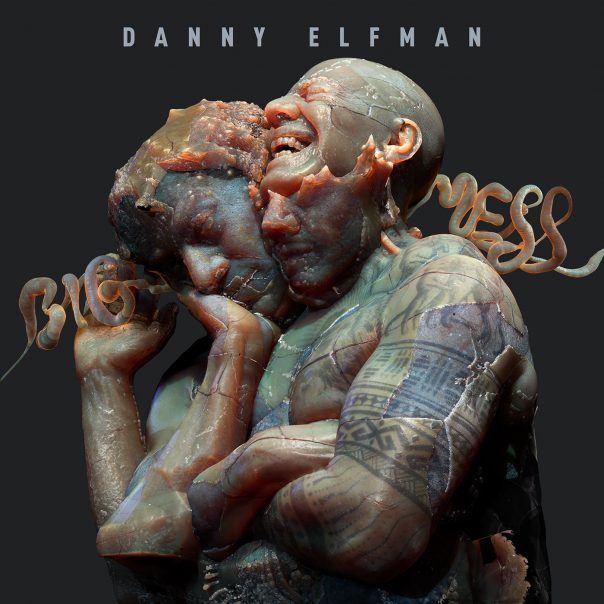ALBUM REVIEW: Danny Elfman conducts a frenetically glorious ‘Big Mess’

To fully recognize Danny Elfman‘s expansive CV would take up the rest of the word count of this review. The singer, songwriter and composer began his career in the early ’70s with Oingo Boingo and branched out into scoring films, penning television theme songs and composing for live concert performances. The breadth of Elfman’s influence is a staggering feat. For his first solo work in more than 30 years, the composer draws on his decades of experience and channels it into an unexpected and exciting place.
Big Mess
Danny Elfman
Epitaph, July 11
9/10
On one hand, Danny Elfman takes the orchestral fervor of which he’s become accustomed. On the other, he takes the raw intensity of guitar-driven progressive rock. The resulting 18-track double album is challenging, aggressive, weird and requires you to listen. He tackles a rock album with the mindset of a composer, making for a complex layering of instruments, panning and just about every tool in the musical tool chest.
The opening track, “Sorry,” is punishing and hard-driving riff-rock, with orchestral and operatic overtones. The song is a journey within a journey during its five minutes. Elfman’s vocals are surprisingly compelling, with a raw tenacity that pairs well with the aggressive instrumentation. “I’m not afraid to die/ I’m still alive/ And I won’t let you bury me,” he sings in the urgent final moments.
It’s unfair to sum up the project as simply a rock album, as it covers ample musical ground along the way. There are echoes of modern alternative, the bombast of Muse, the electro-aggression of Nine Inch Nails or the larger-than-life presence of a David Bowie. There might even be a pinch of Tool in this “throw the rules out the window” mindset.
Songs like “In Time” bring something entirely different, a dark and percussive journey that feels very much like it could score the opening scene of a summer blockbuster. Elfman’s vocals are deep, lush, and feel like like they’re narrating rather than singing.
“Everybody Loves You” moves in the other direction, with tripped-out rock bouncing between acoustic guitar riffs and fuzzy distorted hard rock. The track is the longest on the record, clocking in at more than seven mind-bending minutes. Danny Elfman found lyrical inspiration from America’s political climate, some of which is very evident in his intense delivery. Where he really exceeds is keeping the album accessible. While the music is complicated, challenging and sometimes a little odd, the songs are digestible without pretext.
Tracks like “Serious Ground” provide a stark contrast, jumping between the rhythmic Spanish-influenced verses to the apocalyptic wall-of-sound chorus. The pace quickens and the urgency grows as it crescendos at the height of mania before falling away entirely to just his vocals at the end. He minces few words on “Choose Your Side,” including samples from speeches by the 45th President of the United States. “My imagination never saw this,” Elfman sings with stark honesty.
“Happy” provides a sharp musical curveball, opening with a stylistic 8-bit video game synth. It becomes an operatic track, somehow, with a call and response between Elfman’s deep and dulcet tones, with his higher register offering the response. “Happy” escalates into an orchestral electro track before swerving into raw punk. The stylistic shifts continue at a breakneck pace.
The peppy “Just a Human” proves to be a ton of fun because of its relatively simpler structure. Within three minutes, it mixes Queen with Black Flag, with few bells and whistles. It’s an effective fist-pumper.
The down and dirty grooves of “Love in the Time of COVID” toe the line between weird and contemporary. A driving drum track carries the pace with a fuzzy blues guitar riff playing off of Elfman’s gritty vocals, which are layered and provide added thrills. The low end of the bass plays a more prominent role in the one-two punch of “Native Intelligence” and “Better Times,” with Elfman’s vocals occasionally calling back to some of Scott Weiland’s more glam-rock-influenced days of Stone Temple Pilots.
The aggressive but almost narrated beat-poet vocal delivery of “Kick Me” and “Get Over It,” to some degree, sound like what Metallica was going for when it collaborated with Lou Reed. The latter of the two tracks provides an added boost of strings and a choir vocals, and brings the album near the close with one of the best tracks on the album.
Big Mess is anything but. It’s worthy of a listen for fans of Danny Elfman or hard rock, or even orchestral enthusiasts. The album’s highly creative work may not necessarily be for everyone, but at its finest moments, Elfman absolutely soars.
Follow writer Mike DeWald at Twitter.com/mike_dewald.
